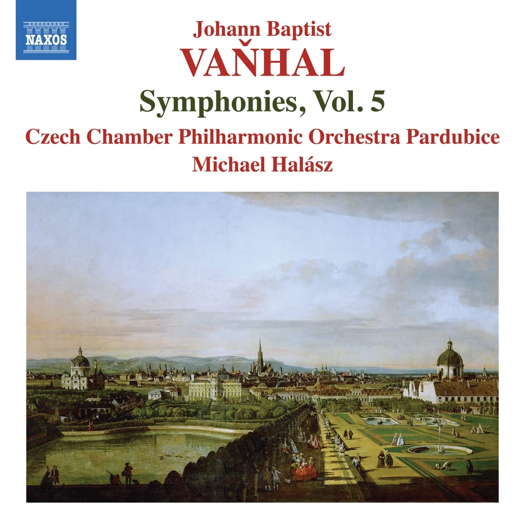 VIDEO PODCAST: New Recordings - Find out about Adrian Williams, Andriy Lehki, African Pianism, Heinrich Schütz and Walter Arlen, and meet Stephen Sutton of Divine Art Recordings, conductor Kenneth Woods, composer Graham Williams and others.
VIDEO PODCAST: New Recordings - Find out about Adrian Williams, Andriy Lehki, African Pianism, Heinrich Schütz and Walter Arlen, and meet Stephen Sutton of Divine Art Recordings, conductor Kenneth Woods, composer Graham Williams and others.

Finely Wrought
Symphonies by Johann Baptist Vaňhal, recommended by GERALD FENECH
'Michael Halász conducts with the usual panache, drawing committed performances full of zest and swagger from the Czech Chamber Philharmonic Orchestra.'
It sometimes seems a misfortune that the latter half of the eighteenth century saw three musical titans - Haydn, Mozart and Beethoven - arrive in such close proximity to one another. All three were accorded great adulation, and deservedly so, but this left a handful of lesser, but highly gifted, composers the victims of under-appreciation who might, had they lived in a different period, themselves been put in the top drawer of musicology. So, while the Bohemian composer Johann Baptist Vaňhal was, without a doubt, one of the century's finer musicians, precious little attention has been paid to him, and a comprehensive list of his works has never been managed. Vaňhal's music was much loved in Vienna and profusely published in Paris and the Austrian capital during his lifetime, and there are hundreds of works to his credit, but a lack of reliable contemporary accounts of him and difficulties in distinguishing authentic and spurious works have made assessment extremely difficult.
Born on 12 May 1739 in Nechanice, Czechia, Vaňhal came into this world as a bounded servant to a noble family of not insignificant wealth. As a boy he learned to play the violin and several keyboard instruments. At age thirteen he became organist in Opoczna. Seven years later he moved to Vienna where he soon made a name for himself as violinist and composer, and in the process earned enough money to buy his own freedom. The years 1769 and 1770 were spent in Italy after which he returned to Vienna to remain, save for some minor excursions and visits to local courts. He never married and had no heirs when he died on 20 August 1813 in Vienna, leaving behind an immense output that consists mainly of some seventy-five symphonies, between fifty and ninety string quartets and over seventy keyboard sonatas. He also composed several operas, but unfortunately all have been lost.
Of the instrumental genres in which Vaňhal composed, only the symphonies and string quartets have been thoroughly investigated. But a serious examination of all the sources for his symphonies is hampered by the simple fact that there are no autograph scores and therefore no indisputable way to prove that he in fact wrote the symphonies that have survived. Establishing reliable composition dates for the majority of the works is also problematic, so we have to go ahead on what we do have. From circa 1770, Vaňhal's symphonies exhibit an unusually high degree of stylistic change, a characteristic he shares with both Haydn and Dittersdorf. Most of these works adopt the four-movement form that came to dominate the late eighteenth century symphony, and in general there is a gradual increase in the length of the individual movements and the melodic material from which they are constructed.
Music historian Charles Burney commented that Vaňhal's symphonies were known in England before those of Haydn, and this Volume 5 in the ongoing Naxos cycle dedicated to Vaňhal's symphonic output certainly has the answer to those who might feel surprised by Burney's statement.
The three symphonies on this issue are finely wrought pieces, especially the Symphony in F minor, which is considered one of the most outstanding in the genre.
Listen — Vaňhal: Allegro molto (Symphony in F minor)
(8.574305 track 3, 0:00-1:00) ℗ 2022 Naxos Rights (Europe) Ltd :
The other two symphonies on this programme, in E Flat and C, were also highly popular in the composer's lifetime. These pieces illustrate all of Vaňhal's sophisticated mastery of musical structure, imaginative handling of the orchestra and an abundance of memorable themes.
Listen — Vaňhal: Andante molto (Symphony in C)
(8.574305 track 9, 0:00-0:51) ℗ 2022 Naxos Rights (Europe) Ltd :
Cast in five movements, the Oboe Concertino is a splendidly constructed work that brings to the fore all of Vaňhal's gift for attractive and inventive writing. The violone part in particular contains some very virtuosic passages, and reminds one that he composed one of the best-known double-bass concertos of the period. This is light and lively music, brimming with knockout tunes and harmonic ingenuity.
Listen — Vaňhal: Finale: Allegro (Oboe Concertino)
(8.574305 track 16, 3:50-4:44) ℗ 2022 Naxos Rights (Europe) Ltd :
Michael Halász conducts with the usual panache, drawing committed performances full of zest and swagger from the Czech Chamber Philharmonic Orchestra. Pristine sound quality and informative annotations complete a disc which I warmly recommend.
Copyright © 8 March 2022
Gerald Fenech,
Gzira, Malta

CD INFORMATION: JOHANN BAPTIST VAŇHAL SYMPHONIES, VOL 5



